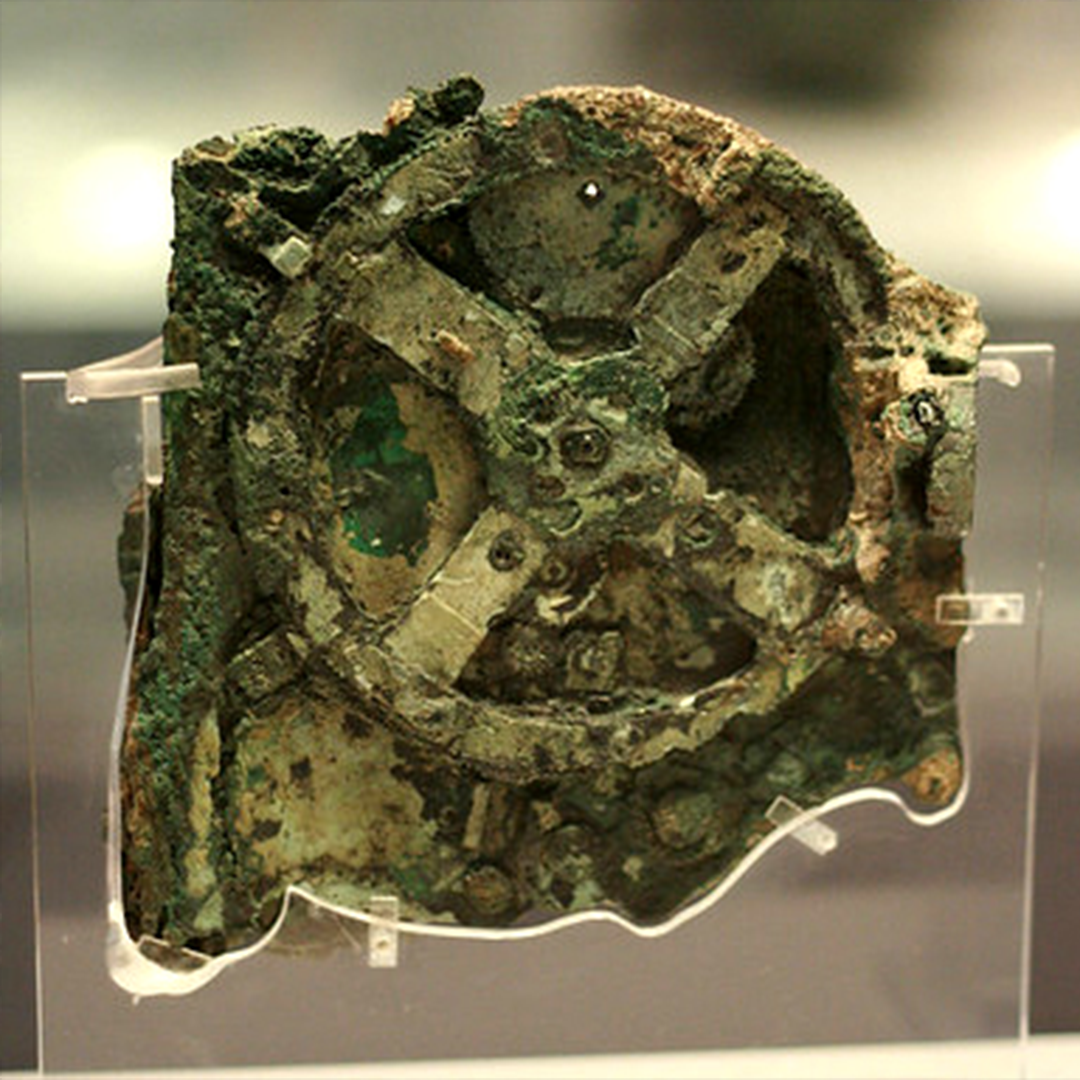The Parthenon and Centennial Park Conservancy present The Antikythera Mechanism in the Parthenon’s West Gallery from Friday, June 4, through November, 28. The exhibit tells the story of one of antiquity's most significant technological artifacts.
In 1900, a group of sponge divers working near the tiny Greek island of Antikythera were amazed to discover an ancient shipwreck loaded with treasure. Among the recovered statues and jewelry was a crumbling bronze remnant with traces of mechanical dials and gearwheels. The fragments were so badly corroded that scant metal remained, but over a century later, the Antikythera Mechanism, as the pieces became known, continues to capture the imagination. Scholars believe it once took the form of 37 bronze gearwheels in a wooden case with pointers on a large front dial that calculated the movements of the sun, moon and planets through the sky, while spiral dials on the back functioned as a calendar and predicted future eclipses. Thought to have been created around 150 BCE, the mechanism is often called the world’s first analog computer. It is an amazing document of ancient Greek advancements in astronomy, mathematics, and technology that did not appear in Europe again for roughly another 1500 years.
The Antikythera Mechanism exhibit will feature both a reproduction and replica of the mechanism along with an illustrated narrative of its history on wall panels. Exhibition panels and content will be supported by the scholarship of Dr. Xenophon Moussas of the National and Kapodistrian University of Athens, who is providing a “reproduction” of the Antikythera mechanism as it would have looked when it was made in the 1st c. BCE. This reconstruction is the result of 100 years of study by leading scientists and archaeologists and features bronze dials in a wooden case to frame the gears of the mechanism. The Parthenon is also commissioning a custom 3D printed replica of the Antikythera Mechanism to show the difference between the interpretive reproduction and how the artifact looked upon discovery on the ocean floor. Mounted on custom cabinetry, the replica will be interactive for visitors. The contrast between reproduction and replica will tell the story of this incredible archeological find and offer visitors the opportunity to understand how the Antikythera Mechanism was discovered then interpreted by experts.
According to Dr. Moussas, the Antikythera Mechanism is, “One of the greatest discoveries of ancient artifacts globally. It proves that humans conceived and constructed a mechanical cosmos much earlier than believed. An epitome of Greek natural philosophy, it models the universe using mathematics, following the Pythagorean doctrine that numbers determine everything and describe nature.”
During the course of the exhibition, The Parthenon will present a series of Symposia providing an opportunity for the public to learn more about archaeological conservation, underwater archaeology, and great archaeological discoveries and how they all relate to the Antikythera Mechanism. All Symposia will be free to the public and held virtually via Zoom.
June 16 at 11 AM - Great Archaeological Discoveries with Dr. Steven L. Tuck, a Professor in the College of Arts & Science at Miami University in Oxford, Ohio.
July 21 at 10 AM - Conserving the Antikythera Mechanism with Dr. Georgianna Moraitou. Dr. Moraitou is the Head of Conservation at the National Archaeological Museum of Athens, part of the Hellenic Ministry of Culture. She has a Ph.D. from the National Technical University of Athens, Deterioration and Protection of Ancient Glass.
August 18 at 11 AM - Underwater Archaeology Basics with Dr. Anne Duray. Dr. Duray holds a Ph.D. in Classics with an Archaeology track from Stanford University and is an Editorial Assistant for the American Journal of Archaeology, and served as a Lecturer at the Archaeology Center at Stanford University.
September 23 at 6 PM - Bigger fish to fry: Fishing and fish consumption in Archaic Greek Sicily with Dr. Davide Tanasi. Dr. Davide Tanasi will talk about fish and fish products! They are an important nutritive source for humans, rich in proteins, fats and fat-soluble vitamins and they were largely celebrated and discussed in various genres of Greek literatures. REGISTER
The Antikythera Mechanism exhibit is funded in part by a grant from Humanities Tennessee, an independent affiliate of the National Endowment for the Humanities.
Virtual Gallery Tour
The Antikythera Mechanism highlight tour is funded in part by a grant from Humanities Tennessee, an independent affiliate of the National Endowment for the Humanities. The findings and conclusions of this video do not necessarily represent the views of Humanities Tennessee or of the National Endowment for the Humanities.



